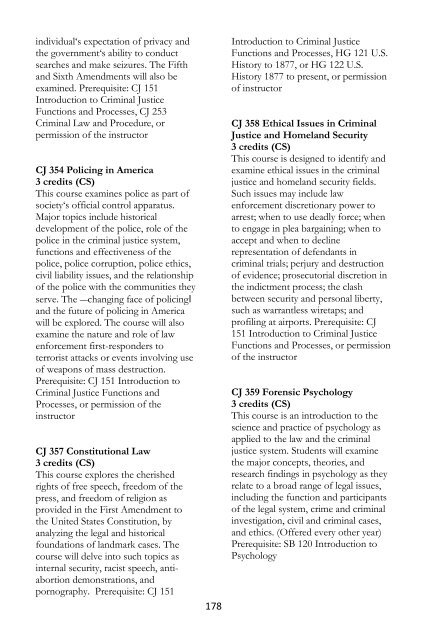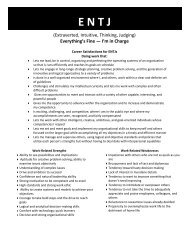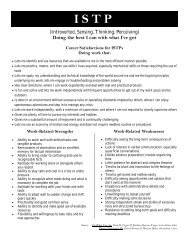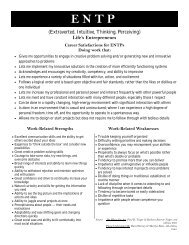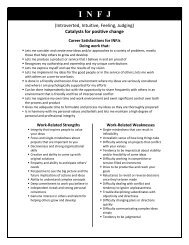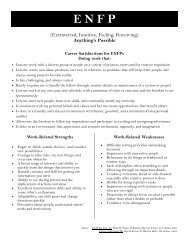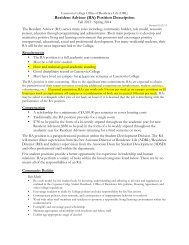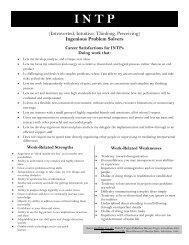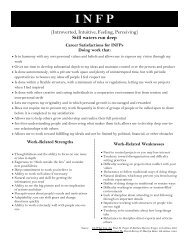Cazenovia College 2012-2013 Academic Catalog
2012-13 Academic Catalog - Cazenovia College
2012-13 Academic Catalog - Cazenovia College
You also want an ePaper? Increase the reach of your titles
YUMPU automatically turns print PDFs into web optimized ePapers that Google loves.
individual‘s expectation of privacy and<br />
the government‘s ability to conduct<br />
searches and make seizures. The Fifth<br />
and Sixth Amendments will also be<br />
examined. Prerequisite: CJ 151<br />
Introduction to Criminal Justice<br />
Functions and Processes, CJ 253<br />
Criminal Law and Procedure, or<br />
permission of the instructor<br />
CJ 354 Policing in America<br />
3 credits (CS)<br />
This course examines police as part of<br />
society‘s official control apparatus.<br />
Major topics include historical<br />
development of the police, role of the<br />
police in the criminal justice system,<br />
functions and effectiveness of the<br />
police, police corruption, police ethics,<br />
civil liability issues, and the relationship<br />
of the police with the communities they<br />
serve. The ―changing face of policing‖<br />
and the future of policing in America<br />
will be explored. The course will also<br />
examine the nature and role of law<br />
enforcement first-responders to<br />
terrorist attacks or events involving use<br />
of weapons of mass destruction.<br />
Prerequisite: CJ 151 Introduction to<br />
Criminal Justice Functions and<br />
Processes, or permission of the<br />
instructor<br />
CJ 357 Constitutional Law<br />
3 credits (CS)<br />
This course explores the cherished<br />
rights of free speech, freedom of the<br />
press, and freedom of religion as<br />
provided in the First Amendment to<br />
the United States Constitution, by<br />
analyzing the legal and historical<br />
foundations of landmark cases. The<br />
course will delve into such topics as<br />
internal security, racist speech, antiabortion<br />
demonstrations, and<br />
pornography. Prerequisite: CJ 151<br />
178<br />
Introduction to Criminal Justice<br />
Functions and Processes, HG 121 U.S.<br />
History to 1877, or HG 122 U.S.<br />
History 1877 to present, or permission<br />
of instructor<br />
CJ 358 Ethical Issues in Criminal<br />
Justice and Homeland Security<br />
3 credits (CS)<br />
This course is designed to identify and<br />
examine ethical issues in the criminal<br />
justice and homeland security fields.<br />
Such issues may include law<br />
enforcement discretionary power to<br />
arrest; when to use deadly force; when<br />
to engage in plea bargaining; when to<br />
accept and when to decline<br />
representation of defendants in<br />
criminal trials; perjury and destruction<br />
of evidence; prosecutorial discretion in<br />
the indictment process; the clash<br />
between security and personal liberty,<br />
such as warrantless wiretaps; and<br />
profiling at airports. Prerequisite: CJ<br />
151 Introduction to Criminal Justice<br />
Functions and Processes, or permission<br />
of the instructor<br />
CJ 359 Forensic Psychology<br />
3 credits (CS)<br />
This course is an introduction to the<br />
science and practice of psychology as<br />
applied to the law and the criminal<br />
justice system. Students will examine<br />
the major concepts, theories, and<br />
research findings in psychology as they<br />
relate to a broad range of legal issues,<br />
including the function and participants<br />
of the legal system, crime and criminal<br />
investigation, civil and criminal cases,<br />
and ethics. (Offered every other year)<br />
Prerequisite: SB 120 Introduction to<br />
Psychology


